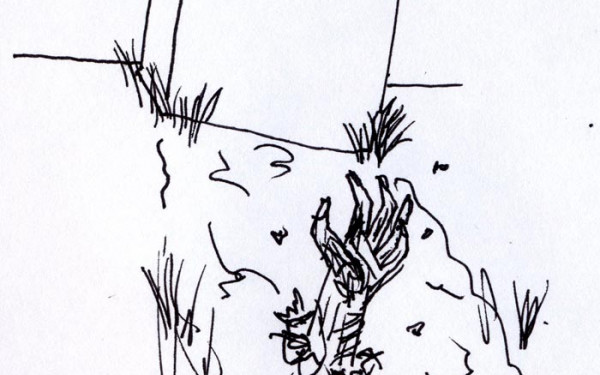Laytonest of the Best
Finalists Revealed for the Irving Layton Award for Poetry
Four emerging writers from Concordia’s Creative Writing program—Nick Comilla, Jason Freure, Candice Maddy Fridman and Emma Healey—read from their poems shortlisted for the Irving Layton Award in poetry last Friday.
The reading took place on the 11th floor of the EV building. The writers read in front of floor-to-ceiling windows, thrown against the horizon of Montreal’s downtown and a landscape of sky. As the city lights began to make their mark on the emerging night, the writers, too, made their mark on the small audience with the language of poetry.
The poetry jury for the 2011 Irving Layton Awards consisted of English department staff Mary di Michele, Sina Queyras and David McGimpsey.
Comilla, a fourth year creative writing, English literature and philosophy student, read from his poem “Pure Form,” a poem that has been revised five to seven times over the past two years.
“The hardest thing with this poem is that it started off completely differently than how it ended up, besides the repeating words and […] phrases here or there,” he said.
“The poem went from being sexy fun to being philosophical [and] conceptual to actually having issues with the subject matter and not just celebrating it.”
Di Michele said that Comilla’s poem shows a master of form. “‘Pure Form’ is a poem that doesn’t leave the body behind,” she said. “[It is] a poem that is both fully dressed and naked.”
“Sometimes the form is as important to me as the words,” Comilla said. “The form takes the words or the refrains and reinvents them, shows every side to them.”
Fridman, a third-year creative writing student, read from her piece “Marie Reine du Monde After A.M. Klein, or, Notes on Ecclesia Triumphans by a Wandering Jew on a Bixi.”
While Comilla’s poem concerned itself primarily with questions of form, Fridman concentrated instead on the powers of language in her piece.
“I have a bad habit of liking a particular word, wanting to build a poem around it, being quite unwilling to sacrifice the word to spare the poem,” she said. “I’m learning.”
Her shortlisted poem was noticed by the jury for its blending of the French and English languages while maintaining a sense of play, a cultural engagement and an expansiveness of thinking. Di Michele called the piece “contemporary and daring.”
Fridman composed the first draft of the shortlisted poem while daydreaming in an Italian language class. “We were learning the diminutive form. This was the second class—the first being art history—where a professor had mentioned that Marie-Reine-du-Monde on René Levesque is a 1/5 scale model of San Pietro, in Rome,” she said. “There’s this fascinating political story behind the construction of it.
“Also, I had been reading a lot of A.M. Klein and thinking about his Franglophone vocabulary and his obsession with Joyce and his Wandering Jew.”
Freure, an English literature student and member of the Montreal Slam Poetry Collective, read from his piece “St-Laurent Boulevard.” A poem, as di Michele explained, polyphonically takes the reader up and down the Main, calling it, “a poem that sustains its language pulse.”
Freure read from a section of the poem—the section that he described as being the catalyst for the larger body of the work.
“It started with one section, the section I read, which came pretty quickly,” Freure said regarding his writing process for the poem. “When I read it to Chris Clarke at Argo Bookshop he said, ‘But that’s only one part of the street.’”
Realizing Clarke was right, Freure edited the poem, adding new sections and details that better encompassed the sprawling Montreal street.
Closing off the readings, Healey—a second year English literature, creative writing and philosophy student who was last year’s recipient of the Irving Layton Award for poetry—read from her autobiographical poem “Everything Is Glass.”
“Everything Is Glass” exhibits a “joyful command of language,” according to the judges of the award.
According to Healey, the poem was written in about three hours while sitting in her kitchen.
“This poem was weird—usually I take ages to work an idea into anything that’s even vaguely intelligible or useful or whatever.
“It’s sad that things that happen that way are often the things that turn out to be your favourites—you want to believe that all the agony and revision is always toward something, that it’s a pain but at least it’s the most effective method,” she said.
“But sometimes good things just happen.”
Healey described her writing process as being physically akin to attempting to pull her own spleen out through her eye sockets.
“Probably this is unnecessary and only means I am doing it wrong but I haven’t yet figured out another way,” she said.
The winner of the Irving Layton Award for poetry will be announced at a ceremony honouring the English Undergraduate awards winners at 2:00 p.m. in LB-646 on March 25. Also, be sure to check out next week’s Lit section for some coverage of the Fiction
finalists.

__900_1056_90.jpg)




